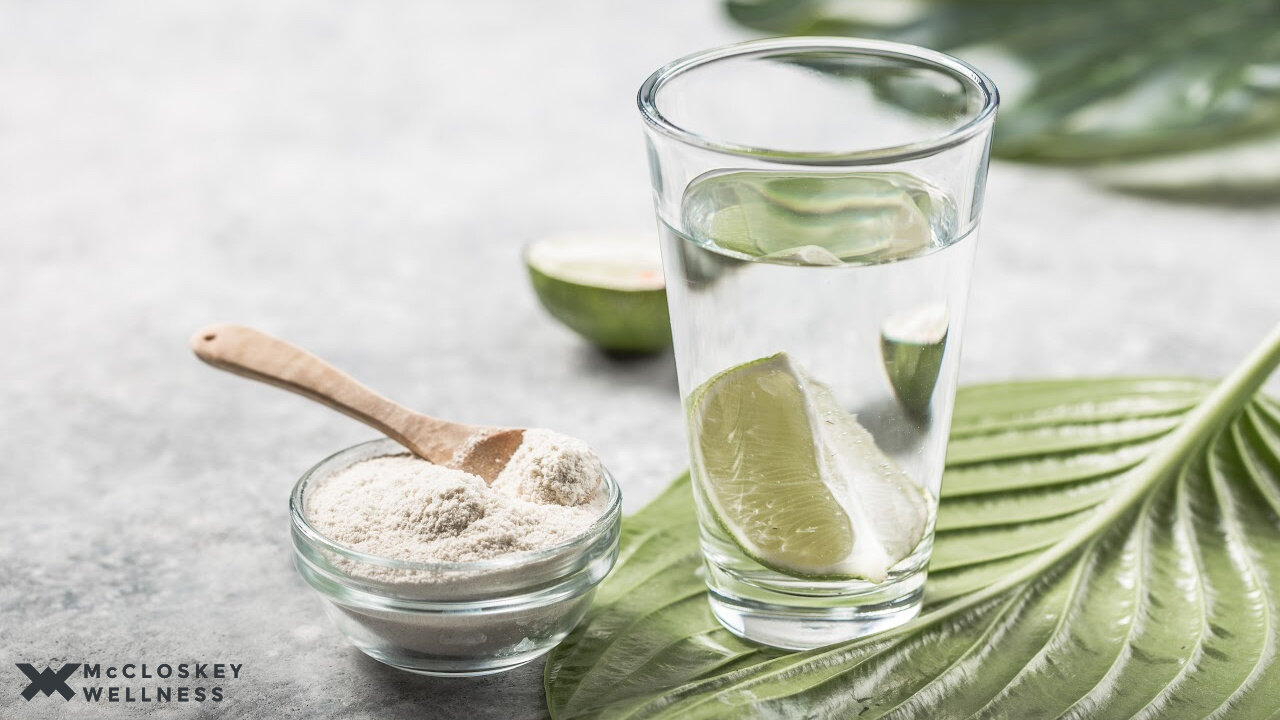Collagen has become such a buzz word in these past several years - maybe seeming more like a fad than an ancient building block to our human bodies. It’s been popularized in the beauty section of the stores for decades because of its importance for overall appearance, but what exactly is collagen and why is it important for health?
What is collagen?
Collagen is the most abundant protein found within our bodies. It makes up 30% of the total protein in the body and 70% of the protein found in your skin. Essentially, it’s the glue that holds us together.
As we grow older, we start to produce less and less of it. It’s been shown that by age 40 we produce about 25% less collagen. And by the age of 60, we are producing 50% less collagen daily (1). You can notice physical signs like wrinkles, cellulite, saggy skin, joint pain, and thinning hair to name a few. Some people think this is just a part of the aging process, and while it might be, the lifestyle factors that you choose every single day determine how your life will end up. You can consciously choose to do certain things that will keep you younger longer. Consuming collagen and collagen-promoting foods is one of those things.
Different types of collagen
There are many different kinds of collagen that all have unique benefits for our body. There are actually over 20 known types of collagen found within the human body. The main ones are types I, II, III, IV, V, and X. Types I, II, and III make up nearly 90% of the collagen within our bodies and can easily be consumed through certain foods.
Type I
The most abundant type of collagen found within the human body. It can be found in your tendons, ligaments, organs, muscles, and skin. Type I is also found in the gut which helps to line the GI tract. Getting more of this type of collagen in your diet can help with joint repair, hair growth, nail strength, and several autoimmune conditions due to its ability to heal the gut.
Type II
Mainly found in the joints so it helps to build cartilage. It’s very beneficial for helping arthritis-like conditions and preventing further joint damage. Consuming more type II collagen can help your joints stay more youthful longer.
Type III
Along with type I and II, type III is another main collagen that is very crucial for our bodies. Due to its structure, it makes up our organs and is what gives our skin its elasticity. It’s also been found in large quantities within the heart and helps to line the blood vessels. For this reason, consuming more type III collagen has been shown to help with cardiovascular issues (2).
Type IV
This kind of collagen, although not as prominent as the first three, has a very important role of lining the muscles, organs, and fat within our bodies. It comprises the basal lamina of the endothelial cells which line the organs and are required for blood vessels and nerve functions.
Type V
Very important for females. This kind of collagen lines the placentas, helping to nourish the child, while removing wastes during the pregnancy process.
Type X
Involves formation and protection of bones and the process of endochondral ossification, which is essentially the creation of bone tissue.
Enjoying This Content?
Join our weekly newsletter to receive exclusive content like the latest articles, episodes, recipes, and access to our Ultimate Autoimmune Reset™!
Different types of nutritional collagen
Bovine collagen
A fancy name for collagen found within the cartilage and bones of ruminants. Consuming a beef bone broth is a great way to get in massive amounts of bovine collagen! You’ll get types I and III consuming this kind of collagen, along with amino acids proline and glycine, which help the body to run more smoothly. These amino acids help to keep your blood vessels and joints strong, while improving your overall cardiovascular health.
Fish collagen
Very easily absorbable, fish collagen is rich in amino acids proline, glycine, and hydroxyproline, as well as a good source of type I collagen.
Chicken collagen
Mostly rich in type II collagen, this is a great resource to use for joint health as it’s a great cartilage builder. Naturally rich in chondroitin and glucosamine sulfates, together these are powerful anti inflammatories that help joint pain, improve immune function, and overall wellness.
Egg shell collagen
Oddly enough, egg shells (and whites) contain type I, II, II, IV, and X types of collagen. It contains glucosamine sulfate, chondroitin sulfate, hyaluronic acid, and other amino acids which help to build muscle, increase wound healing, and reduce inflammation throughout the body. I recommend finding a high quality supplement or use pasture raised eggs from locally raised chickens.
6 benefits of collagen
1. Great for hair, skin, and nails
Do you have thinner hair, looser skin, and more wrinkles than you did even just a few years ago? Knowing that collagen production goes down as we age, you can counteract this by adding more collagen into your diet.
According to a randomized controlled trial published in the journal Nutrients, women who received a collagen supplement for 12 weeks, compared to women who received a placebo, saw “significantly improved skin hydration, elasticity, roughness, and density" (3).
2. Improves joint function
Also as we age, our tendons, ligaments, and joints tend to lose their collagen as well, leading to stiffness, swollen joints, and pain. Type II collagen especially will actually help to build back up our cartilage and and protect our joints, helping us to move more freely without pain and more flexibility.
Individuals who suffer from the autoimmune condition rheumatoid arthritis, can see great improvements with collagen supplementation. In a randomized double blind, placebo controlled trial, 284 patients were divided into two groups. Half were given a placebo and half were given a low dose collagen supplement for 24 weeks. At the end of the trial, researchers concluded that “positive effects were observed with CII (collagen type II) at the lowest dosage tested, and the presence of serum antibodies to CII at baseline may predict response to therapy...no side effects were associated...” (4).
In short, including more dietary collagen in your life may help to improve your RA and joint function while not containing side effects many prescription drugs contain.
3. Increases cardiovascular health
Consuming collagen also means you’ll be consuming the amino acid proline. Proline has been shown to help the arterial wall with plaque buildup, as well as tissue repair and joint pain (5). It’s also been shown to prevent arteriosclerosis due to its removal of fat from our arteries.
Eating a diet low in sugars and refined carbs, while eating more healthy fats and high quality water can help with overall cardiovascular health as well.
4. Boosts immune system/detox body (liver) naturally
Glycine, the simplest structured amino acid that is naturally found in collagen helps the liver to buffer out toxins we accumulate day to day. One of my favorite ways to reap the benefits of this detox is to do a 1 - 2 day bone broth fast. By consuming just bone broth and structured water for two days you are giving your body a complete flush and a solid liver detox to help you feel rejuvenated and fresh.
The liver uses glycine molecules to bind to toxins which help excrete them out of the body (6). Glycine is considered “non-essential” which means that our body produces it on its own, so we don’t need it through our diet. However, our liver can only make a certain amount. And due to our highly toxic world we live in nowadays, it’s crucial to help detox our bodies as much as we can, so dumping more glycine in our bodies through our diet can help to detox ourselves naturally.
5. Heals the lining of your gut (leaky gut)
Most of the American population suffers from some form of leaky gut. This is just a fancy way of saying that your intestines have microscopic leaks in them that allow toxins throughout your body. This can happen when we ingest things like sugar, gluten, alcohol, toxins, conventional dairy, and other problematic foods into our system.
Collagen has this very unique ability to heal and seal the lining of your gut, ultimately helping autoimmune conditions, like skin conditions, thyroid issues, rheumatoid arthritis, among many others (7).
Several studies have shown that individuals with IBD (inflammatory bowel disease) have blood levels of collagen that are chronically decreased (8, 9). By consuming collagen with its healing amino acids, you can help a lot of your gastrointestinal issues and seal the gut, ultimately helping with other issues as well. Try it for a week and watch the magic happen!
6. Reduces cellulite and stretch marks
You can think of collagen as a natural botox that helps the entire body, not just a targeted area. Collagen has this ability to form a protein called elastin, which makes up the dermis of your skin (10). And since we lose our elastin and connective tissue as we age, by consuming more collagen on a daily basis we can keep our skin looking younger and healthier, and seemingly reverse the aging process.
How do I get more collagen in my diet?
The best, and easiest, way I get it in is by using a high quality protein powder! It’s tasteless and blends easily into my morning bulletproof coffee, afternoon smoothie, or just plain water. By adding a few scoops of this a week in your diet, you may start to see many improvements like tighter skin, longer nails, healthier looking hair, and many other conditions, although individual results may vary.
I’m a fan and supporter of Perfect Keto collagen because they are 100% transparent and authentic with their products. I haven’t found any better than them, especially when it comes to taste! They have several delicious flavors like Vanilla, Peanut Butter, Salted Caramel, Chocolate, Strawberry, and my personal favorite, Cinnamon Toast!
For your first order you can get 15% off anything when you use code ‘CRAIG’ at checkout!
Closing Thoughts
Collagen is something that we would have consumed evolutionarily and now most our diets are completely void in this much needed food. While I will always recommend food sources first, proper supplementation can be beneficial for most. I highly encourage you to find ways you can get more collagen into your diet on a daily basis.
For more content and guidance from me, be sure to sign up for my Ultimate Autoimmune Reset™ today!






